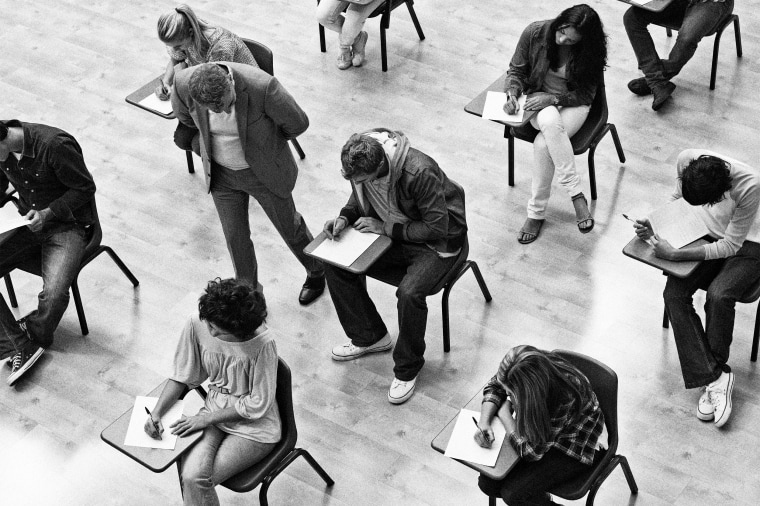On Feb. 22, the Biden administration released its guidance for our country’s schools on how to manage standardized testing this spring. In an attempt to accommodate the extreme measures that schools and teachers have had to take to meet students’ needs during the pandemic, the Department of Education offered schools some flexibility but failed to offer a blanket waiver for all testing this year.
While we appreciate the effort to give schools and educators some leeway, and to make standardized test results less consequential overall, we fear that maintaining testing requirements for this spring will cause more harm than good.
We fear that maintaining testing requirements for this spring will cause more harm than good.
As two former educators whose predominantly Black and brown students not only had to take these tests in “normal times” but often excelled at them, we understand why they exist: to collect nationwide educational performance data to effectively allocate resources to the students that need them most. But the data is not in and of itself a solution.
As we surpass this morbid milestone of half a million lives lost to this pandemic, the challenges faced by students across the country must be addressed. That starts with getting the pandemic under control, shots in people’s arms and more students back into classrooms. But standardized testing will not help the national effort to asses student needs and monitor their social, emotional and academic progress.
Continuing to subject students to standardized testing — especially in this environment — will not provide any actionable information for lawmakers trying to figure out how to resource schools. Put plainly, standardized testing this year will not reliably gauge student performance or identify areas in need of growth.
This type of assessment has a strong track record of identifying socioeconomic differences among the student body whilefailing to accurately determine student performance. Instead of empowering educators to provide the best learning environment possible for students, standardized testing creates perverse incentives in schools that stand in the way of true learning.
Even in the best-case scenarios, educators have made it clear that standardized testing hinders their ability to provide students with the best education possible. Our continued dependence on testing data, particularly this year, not only fails to provide an accurate depiction of the performance of the student population but also structurally limits learning by requiring students to focus on tests instead of other, more collaborative methods.
Making matters worse, preserving the standardized testing mandate risks exacerbating the ongoing youth mental health crisis. We can all agree that children were not built to operate in a remote learning environment. As the Kaiser Family Foundation reported, “Children may experience mental distress during the pandemic due to disruption in routines, loss of social contact, or stress in the household.” Existing research suggests children are facing higher rates of anxiety, depression and post-traumatic symptoms related to the pandemic. Even though the administration has waived certain accountability measures, leaving a lot of the final decisions up to states, administering any tests this spring will still unnecessarily expose students to the high-stress nature of these tests.
It has long since been time for the country to adopt a new student evaluation paradigm that centers the experience of students and fosters organic growth. This year could actually give us the opportunity to turn away from standardized testing as the backbone of our evaluation system and allow educators to use other, more accurate methods.
Many educators have long been clear that regular grading provides the best assessment of student performance in schools; we should empower teachers to focus on the curricula and assessments that best serve students. We can integrate evaluations more seamlessly into the learning environment by utilizing stealth assessments in lesson plans. Project-based learning and assessments can help develop the critical thinking skills necessary to succeed in the jobs of the future. For example, schools in the New York Performance Standards Consortium have shown how to evaluate student learning with unique, nontest assessments of what students actually know and can do: write persuasive essays, give oral presentations, engage in scientific experiments and undertake independent research, among other things.
Any of these evaluation metrics or a combination of them would provide a more holistic and accurate understanding of student performance than the current regime.
After the year our children have had, we must consider their well-being above all else when making decisions about schooling. While policymakers rightfully value data when determining funding, we must make sure we base our decisions on the most accurate and relevant data, paying particular attention to the needs of the low-income, Black and brown communities across the country hit hardest by Covid-19 and the recession.
As we look to address the structural inequities and shortcomings in all of our systems exposed by the pandemic, we must begin by addressing the flawed evaluation metrics in our classrooms and move toward more authentic performance assessments of learning. In doing so, we can actually meet our students where they are and better position them for future success.



